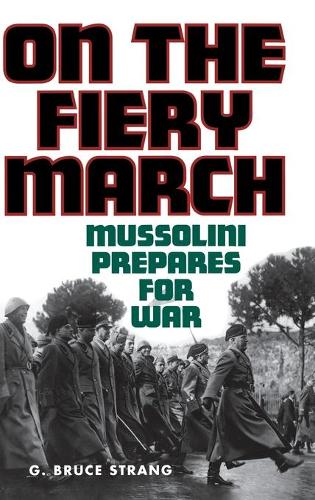
On the Fiery March: Mussolini Prepares for War
(Hardback)
Publishing Details
On the Fiery March: Mussolini Prepares for War
By (Author) G. Bruce Strang
Bloomsbury Publishing PLC
Praeger Publishers Inc
30th July 2003
United States
Classifications
General
Non Fiction
Second World War
Modern warfare
Far-right political ideologies and movements
940.540945
Physical Properties
Hardback
400
Width 156mm, Height 235mm
765g
Description
By the 1930s, Fascist dictator Benito Mussolini had reached the conclusion that Italy faced a clear choice: expand its power at the expense of the British and French Empires, or face stagnation and decline. He believed that the regimes in the democratic West would not be able to contain their inherent hostility toward fascist dynamism, while their demographic and political weaknesses provided the opportunity for the younger, demographically more virile Fascist Italy to carve out a new empire in the Mediterranean status quo. Through his intervention in the Spanish Civil War and his attempts to challenge French power in Europe and British imperial domination in the Middle East and East Africa, Mussolini sought to change decisively Italy's long-standing position as the least of the Great Powers. Although the Pact of Steel did not always function smoothly, Mussolini remained loyal to its principles. The Duce eventually threw Italy into World War II, where he would belatedly discover that his regime had signally failed to prepare his legions to fight a modern war.
Reviews
"On the Fiery March looks in meticulous detail at the dealings between these two men in the years between Hitler's rise to power in 1933 and the outbreak of the Second World War. The story is fascintating....[t]he product of considerable scholarship."-The New York Review of Books
[C]learly written, extensively researched, and persuasively argued....Recommended.-Choice
On the Fiery March looks in meticulous detail at the dealings between these two men in the years between Hitler's rise to power in 1933 and the outbreak of the Second World War. The story is fascintating....[t]he product of considerable scholarship.-The New York Review of Books
Strang's well-documented and well-argued book is a valuable addition to a growing body of work on Fascist foreign policy at its lowest point. It ought to be an antidote to those historians who seek to make Mussolini into a statesman.-The International History Review
[A] fine work.- Journal of Modern History
[A] fine work.-Journal of Modern History
[A] fine work.Journal of Modern History
"A fine work."-Journal of Modern History
"Clearly written, extensively researched, and persuasively argued....Recommended."-Choice
"[A] fine work."-Journal of Modern History
"[C]learly written, extensively researched, and persuasively argued....Recommended."-Choice
"Strang's well-documented and well-argued book is a valuable addition to a growing body of work on Fascist foreign policy at its lowest point. It ought to be an antidote to those historians who seek to make Mussolini into a statesman."-The International History Review
Author Bio
G. BRUCE STRANG is Assistant Professor of History at Lakehead University.
